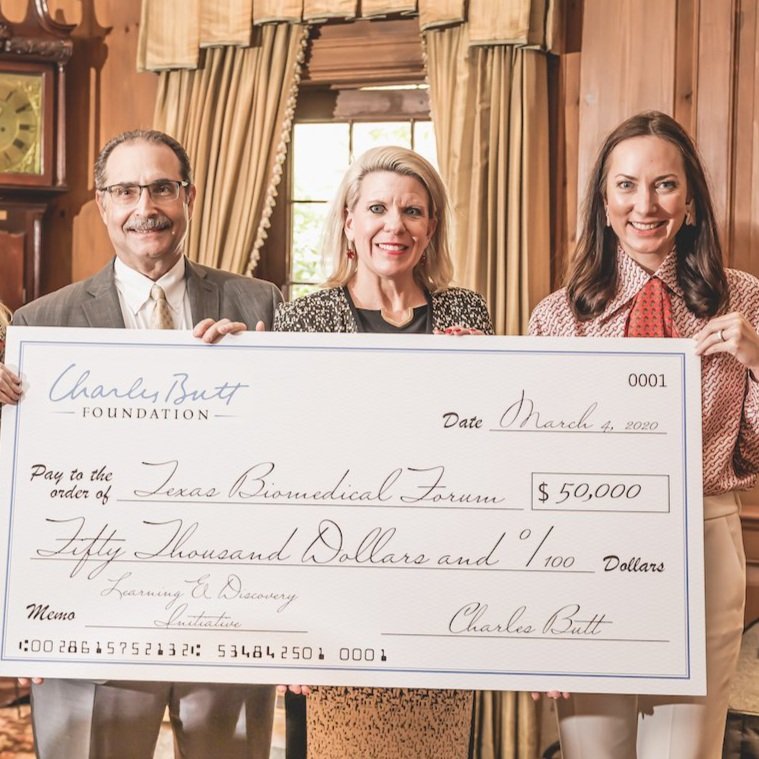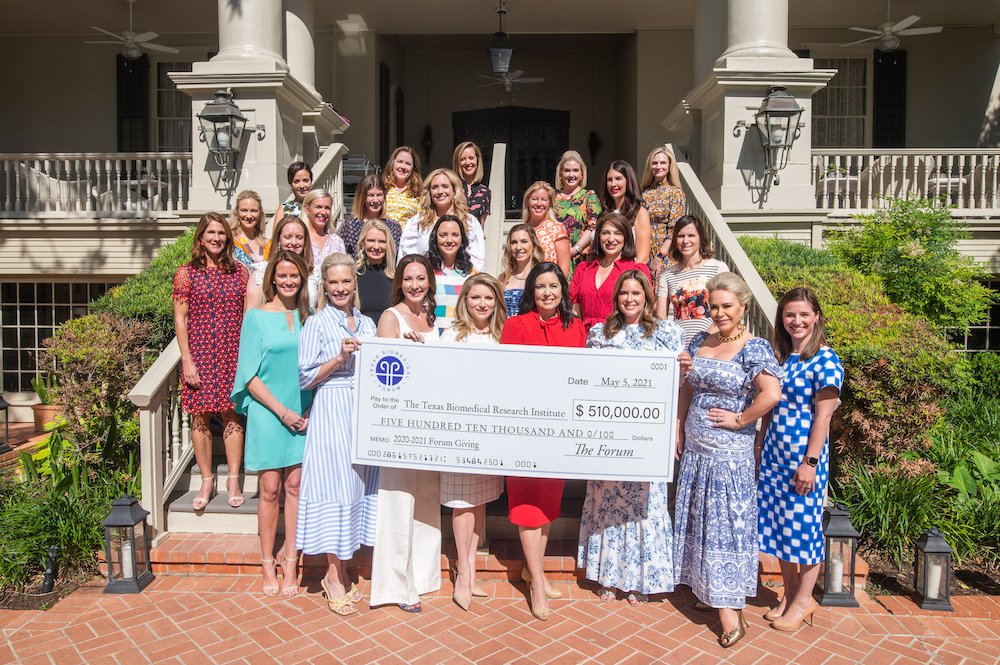2023 Forum Pilot Study Grant Recipients
2023 Texas Biomed Graduate Fellowship, supported by the Douglass Foundation
Jan Simper is a graduate student in the UT Health San Antonio Medical Scientist Training Program, where he is working on an MD and a PhD in microbiology and immunology. He is interested in understanding how people become sick and studying treatments for infectious diseases to help advance medicine forward. For the next three years, he will be training and conducting research in Dr. Larry Schlesinger’s lab at Texas Biomed. Specifically, he will study a family of receptors in lung macrophages, which are a type of immune cell; their role in protecting against tuberculosis infection; and potential host-directed therapies.
2023 cowles postdoctoral fellowship, supported by the cowles family
Mohadesh Soleimanpour-moghadam, PhD, is a mathematician specializing in machine learning and signal processing. She will complete a postdoctoral fellowship in Dr. Diako Ebrahimi’s lab to further advance her research and training in quantitative biology. Specifically, Dr. Soleimanpour-moghadam will develop advanced signal processing algorithms to understand the role of viral infection in cancer. At least 20% of cancers have a viral origin, yet little is known about the underlying molecular and cellular processes involved. Her research over the next two years will aim to disentangle these processes by analyzing large datasets of more than 20,000 cancer patient biopsies.
2023 texas biomedical forum postdoctoral fellow awards
Chrissy Leopold Wager, PhD, is a postdoctoral researcher in Dr. Larry Schlesinger’s lab investigating the immune system’s response to tuberculosis infection and “master regulators” of inflammation. She and colleagues have identified a master regulator – a protein called cyclic AMP response element binding protein (CREB) that is activated in immune cells during Mycobacterium tuberculosis (M.tb.) infection. She hypothesizes that CREB regulates multiple immune cell pathways that control bacterial growth and dictate the outcome of infection. Dr. Leopold Wager will seek to clarify the precise immune cells, pathways and mechanisms involved, which could help identify potential targets for host-directed therapies for tuberculosis.
Lakmini Premadasa, PhD, is a postdoctoral researcher in Dr. Mahesh Mohan’s lab investigating the effect of THC:CBD administration during HIV/SIV infection. (SIV is the nonhuman primate equivalent of HIV.) Thanks to combination anti-retroviral therapy (cART), people with HIV are living longer. However, cART side effects can include hepatotoxicity, leading to liver injury. People living with HIV have a higher risk of developing non-alcoholic fatty liver disease or cholestatic liver disease. Dr. Premadasa will study if THC:CBD administration can reverse liver toxicity induced by HIV/SIV and cART and slow disease progression in nonhuman primate models of HIV. She will also study if the drug semaglutide reduces fatty liver disease induced by high-fat diet. Notably, her project will analyze on the genetic level the interplay between HIV, cART and high-fat diets on the liver, and the treatment effects of THC:CBD and semaglutide.
2023 texas biomedical forum staff scientist awards
Winka Le Clec’h, PhD, and Frederic Chevalier, PhD, are staff scientists in Dr. Tim Anderson’s lab studying parasitic flatworms called schistosomes. The parasites are responsible for an estimated 200 million infections and 200,000 deaths each year. They have a complicated life cycle that involves a larval stage, called sporocysts, growing in freshwater snails, which then produce new larvae that can infect humans. While sporocysts are critical for parasite transmission, they are understudied because they are intertwined with snail tissues and therefore difficult to access. Building on a previous parasite genetic study, Dr. Le Clec’h, Dr. Chevalier and their colleagues will use single-cell sequencing to further investigate the cell types and genes linked to production of human-infective larvae. They will build out a complete atlas of sporocyst cell types and gene expression profiles, with the ultimate goal of identifying targets to disrupt larvae production and block transmission.
Chengjin Ye, PhD, is a staff scientist in Dr. Luis Martinez-Sobrido’s lab working on a live attenuated COVID-19 vaccine that works against multiple variants. The existing vaccines have significantly slowed the pace of the pandemic, but have dropped in effectiveness especially against more recent Omicron variants. A live attenuated vaccine, which contains a weakened, non-harmful version of the virus, could elicit a more robust, long-lasting immune response. Live attenuated vaccines are used for other illnesses including smallpox, chickenpox and yellow fever. Dr. Ye and colleagues will develop a live attenuated vaccine that expresses both the spike protein of the original Washington strain and the Omicron BA.1 strain, and test how safe, stable and effective it is protecting against multiple variants.
2023 texas biomedical forum faculty awards
Assistant Professor Smita Kulkarni, PhD, will investigate the role of long noncoding RNAs (lncRNAs) in how the virus that causes COVID-19, SARS-CoV-2, replicates, and in the body’s immune response. RNA is best known for providing the instructions for making proteins, which then carry out tasks inside the body. But a large part of active RNA does not actually code for proteins. These are called long noncoding RNAs, and are known to help regulate protein-coding genes, immune responses and play prominent roles in health and disease. Dr. Kulkarni hypothesizes that lncRNAs also play a key role in SARS-CoV-2 infection, particularly in early viral replication and immune responses. To study this, she and her team will use lung cells in petri dishes and investigate what happens when certain lncRNAs are blocked. They will also analyze lncRNAs expressed at high levels in the lungs from patients with severe COVID-19 and see what happens when selected lncRNAs are turned off. These insights could then be used for developing more effective treatments and vaccines.
Professor Luis Martinez-Sobrido, PhD, aims to clarify what proteins and amino acids are responsible for making SARS-CoV-2 variants more or less infectious. Better understanding of precise differences will help guide development of superior vaccines and more effective antiviral treatments. Specifically, he and his team will generate variants with different spike proteins using the lab’s reverse genetics system, and compare how the variants behave in cultured cells and in a mouse model. They will then generate variants that have the same spike protein, but different backbones, to clarify what genetic components contribute to changes in how well the virus replicates, spreads and causes disease.
Associate Professor Ian Cheeseman, PhD, will identify critical factors regulating how malaria parasites withstand heat shock. Malaria infection usually involves a person experiencing repeating cycles of high fever. Dr. Cheeseman and collaborators at UT Health San Antonio have identified a transcription factor, which is a molecule that controls the rate DNA is transcribed into RNA, that appears to play an important role in regulating how malaria parasites respond to the host’s fever. Dr. Cheeseman and his collaborators will use advanced sequencing techniques to drill down on the precise molecular mechanisms involved in that response. This is critical to understand how malaria parasites survive spikes in temperature to establish infection. The goal is to find a new drug target unique to the parasite to control and treat malaria.





